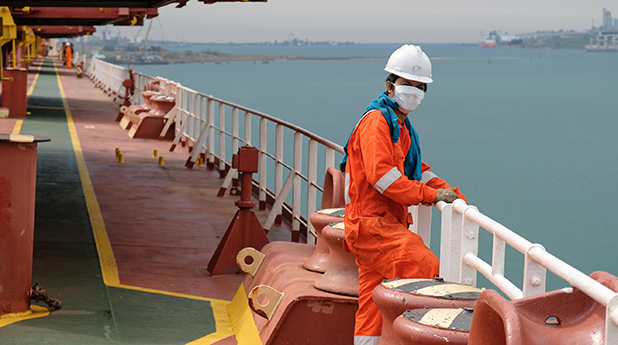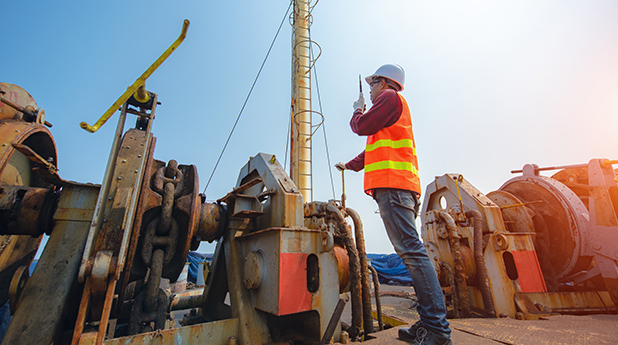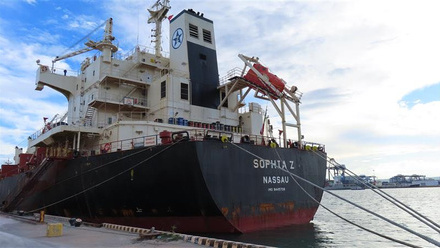Tackling poor mental health at sea
Seafarer mental health is under intense strain. The Covid-19 pandemic and on board conditions have caused immense stress, and other issues, for workers. As World Mental Health Day approaches, what can be done to help?
When IMarEST ran its annual membership survey earlier this year, mental health stood out as a top priority for the next three years. There is a growing recognition that seafarers' mental health and wellbeing needs to be improved.
The Covid-19 crisis was especially trying for seafarers. A Lloyd's Register survey in June 2020 – soon after the first peak of the pandemic – revealed that they felt undervalued in their roles, unhappy, in poor spirits, and unable to focus on their work.
While many others in different sectors shared similar feelings and concerns, seafarers faced a somewhat unique challenge that likely added to their poor wellbeing. Unable to leave the ship due to restrictions, a third of respondents at sea during the survey were on ‘Covid-19 extended contracts’, pushing the total time they had spent on board without time ashore beyond the 11-month limit set by the Maritime Labour Convention. As a result, by June 2020, some reported they had been stuck on board for longer than 17 months.
Since the start of the pandemic, there has been a heightened focus on the mental health and wellbeing of seafarers. In 2021, IMarEST hosted the 1st Global Conference for Seafarer Mental Health & Wellbeing, which brought a range of stakeholders together to discuss practical solutions. The Seafarer Mental Health and Wellbeing Special Interest Group was also launched in the aftermath of the pandemic.
However, as the conference and SIG highlight, seafarer mental health issues aren’t purely a Covid-19 phenomenon. In 2017, a Seafarers International Research Centre report on changes in seafarer health noted reductions in sleep quality, mental health, and a possible increase in psychiatric disorders between 2011 and 2016. In 2019, IOSH, a UK-based chartered body for safety and health professionals, presented evidence that recent-onset anxiety, depression, emotional exhaustion, and burnout were all on the rise amongst seafarers.

Risk factors
A review of seafarer mental health and wellbeing studies by Dr Samantha Brooks and Dr Neil Greenberg at King's College London highlighted several risk factors for poor seafarer mental health. Seafarers under 30 are more likely to face mental health issues, as are those who are unmarried.
High job demands, long working hours, over-commitment to night shifts, scheduling uncertainty, poor perception of management, lack of autonomy, and feeling unsafe are all working conditions that present risks to mental health. In terms of living conditions, exposure to noise/vibration, poor sleep, poor social support, poor recreational facilities, separation from family and home, and feelings of loneliness also increase the risk of mental health issues.
These factors are amongst those regularly flagged in the Mission to Seafarers' quarterly Seafarers Happiness Index, which has been running since 2015. In the most recent report, seafarers drew attention to poor gym and sports facilities, impacting their ability to maintain fitness. Some seafarers report poor quality meals, lack of available snacks, and high cost of food. Perhaps most worrying are reports of some vessels running low on food and water. Seafarers report shore leave can be difficult for various reasons, including managerial restrictions, tight schedules, and some ports and operators not returning to pre-Covid practices.

What can be done?
The review by Brooks and Greenberg, the reports from the Seafarers International Research Centre and IOSH, the Lloyd's Register survey, and the Seafarers Happiness Index all point to actions that could help improve seafarers' mental health and wellbeing.
Many actions relate to life on board vessels – better recreation and health facilities, access to good quality (and quantity) of food, better living accommodation – which includes reduced noise and more comfortable beds – and so on. As highlighted by KVH Industries in their IMarEST webinar "Connections Matter: Crew Wellbeing Through Connectivity & Content," improving the speed and reliability of internet connectivity and making it cost-effective for seafarers to use can help reduce some of the feelings of loneliness and disconnect from family and friends. In terms of work, recommendations revolve around shorter, more regular shifts, reducing the time between shore leave, and fostering a more inclusive, supportive, and respectful work culture.
The need for more resources to specifically support mental health is also strongly recommended. Actions range from training senior staff in recognising potential mental health problems and strategies to support staff, to providing training for all staff on how they can maintain their own mental health and strategies for coping with stress. Providing access to dedicated professionals such as counsellors or welfare officers is also strongly encouraged.
Making professional support services available in itself is not sufficient, however. In the Lloyd's Register 2020 survey, only about half of seafarers reported having access to a professional who could provide personal advice and support. Of those, many didn't take advantage of the service. The reasons were many – some felt they had sufficient support already or simply didn't need it, while others believed it would not help them, or were concerned about the stigma surrounding mental health and possible impacts on their employment.
Fighting the social stigma around mental health is a significant challenge for everyone, not just the maritime industry. As the World Health Organization notes, an estimated one in eight people live with mental health conditions. The stigma surrounding mental health issues can impact people's jobs, social lives, and decisions about whether to reach out for help.
On Tuesday (10 October), World Mental Health Day aims to break down those barriers. This year's message is simple: mental health is a universal human right. “Everyone, whoever and wherever they are, has a right to the highest attainable standard of mental health,” WHO says. Tackling the stigma around mental health, finding solutions, and implementing effective support for seafarers who need it will undoubtedly be a collaborative effort involving governments, maritime organisations, shipowners, and beyond.
If you or someone you know is a seafarer struggling with anxiety, depression, stress, or another mental health issue, here are some resources that may help.
- The Guild of Benevolence: An IMarEST charity that supports those in need within the marine community, and their dependents. Assistance includes grants and help with nursing home fees or home repairs.
- Befrienders Worldwide: Provides support to people when they are suicidal. The centres also helps alleviate misery, loneliness, despair and depression by listening to anyone who feels they have nowhere else to turn.
- The Mission to Seafarers: A network of chaplains, staff and volunteers, available in over 200 ports in 50 countries, and a 24-hour chat service.
- SeafarerHelp: Offers a free, confidential, multilingual helpline for seafarers and their families 24 hours a day, 365 days per year.
- Stella Maris: A network of chaplains and volunteers supporting seafarers, fishers, and their families globally.
- Sailors' Society: Provides a 24/7 chat line, instant chat, and peer-to-peer support groups.
- Seafarers Hospital Society: Funds a 24/7 online support service for seafarers with mental health and wellbeing issues.
- Rehab 4 Addiction: Offers a wealth of resources and information about addiction and mental health; also provides a helpline.






